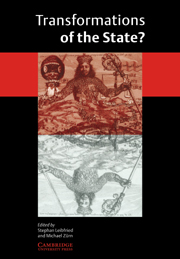Book contents
- Frontmatter
- Contents
- A new perspective on the state
- The modern territorial state: limits to internationalization of the state's resources
- 2 The monopoly of legitimate force: denationalization, or business as usual?
- 3 Globalization and the transformation of the tax state
- The rule of law: internationalization and privatization
- The democratic nation state: erosion, or transformation, of legitimacy
- The intervention state: the shifting welfare component
- Index
3 - Globalization and the transformation of the tax state
Published online by Cambridge University Press: 04 August 2010
- Frontmatter
- Contents
- A new perspective on the state
- The modern territorial state: limits to internationalization of the state's resources
- 2 The monopoly of legitimate force: denationalization, or business as usual?
- 3 Globalization and the transformation of the tax state
- The rule of law: internationalization and privatization
- The democratic nation state: erosion, or transformation, of legitimacy
- The intervention state: the shifting welfare component
- Index
Summary
How does globalization affect taxation? The academic wisdom is split on this question. Some argue that globalization spells the beginning of the end of the national tax state, while others maintain that it hardly constrains tax policy choices at all. This paper comes down in the middle. It finds no indication that globalization will fatally undermine the national tax state, but still maintains that national tax policy is affected in a major way. The effect is not so much to force change upon the tax state as to reduce its freedom for change. Comparing the first three decades of the 20th century to the last three decades, it is remarkable how much change and innovation there was then and how much incrementalism and stasis there is today.
National taxes and global markets
Taxes are monetary levies imposed by governments on persons or other entities. They are compulsory and unrequited: taxpayers are legally obliged to pay taxes and cannot expect to receive any specific benefit in return, such as, for example, a piece of public property or a particular health care treatment in a public hospital. Taxes are not fees. While taxes are presumably collected for the sake of the public good, the liability of the individual taxpayer is independent of the personal utility she derives from that good. This is what makes taxes such a nuisance for the taxpayer and such a versatile source of finance for the state.
- Type
- Chapter
- Information
- Transformations of the State? , pp. 53 - 72Publisher: Cambridge University PressPrint publication year: 2005
- 6
- Cited by



